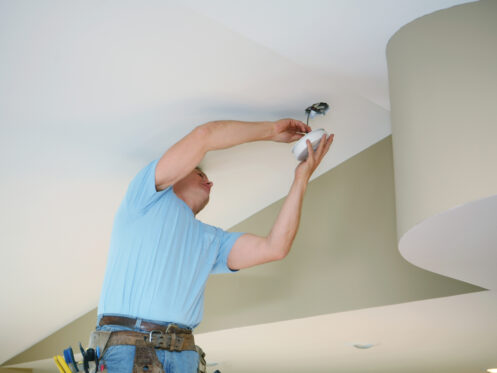Carbon monoxide is often referred to as the ‘silent killer’ because it’s odorless, colorless, and doesn’t smell. This leads to approximately 20,000 emergency room visits, 4,000 hospitalizations, and 400 deaths each year. Fortunately, there are some indicators that you may have a carbon monoxide leak in your Dickinson, TX, home. If you notice any of the following signs or symptoms, be sure to contact emergency services right away and follow up with a trusted HVAC company such as Mackey Services.
Carbon Monoxide Symptoms
Carbon monoxide poisoning has a large impact on your heart and brain. If you’re being exposed slowly over a long period of time, you may feel like you have flu-like symptoms. Be aware that you will not develop a fever. Signs of carbon monoxide exposure include when you or a family member has any combination of these symptoms:
- Weakness
- Headache
- Nausea or vomiting
- Dizziness
- Confusion
- Shortness of breath
- Blurred vision
- Loss of muscle control
- Drowsiness
- Loss of consciousness
It’s possible to face health challenges as part of the long-term recovery from carbon monoxide exposure. Of course, not everyone will have to deal with additional symptoms. Those who do will usually be older and/or will have lost consciousness because of carbon monoxide exposure. Ongoing problems can include nervous system issues such as:
- Personality changes
- Memory loss
- Movement problems
Carbon monoxide poisoning may happen very quickly or over a longer period of time. If you happen to be asleep or unaware of exposure, you are at a huge disadvantage. That’s because it can cause brain damage or death in a very short amount of time.
How Can We Check for a Carbon Monoxide Leak?
The best method is to have a carbon monoxide detector installed by a professional. Consider if you have noticed any dark and/or sooty stains on or around your gas appliances. Consider whether your gas appliances have an orange or yellow flame rather than a typical blue flame. Have you been experiencing increased condensation on your windows? Are your solid-fuel fires burning much more slowly than usual? Does your pilot light keep getting blown out?
If you said yes to any of the above questions, you might have a problem with carbon monoxide. Your best bet is to contact a professional.
What Should You Do If You Notice a Potential Leak?
Aside from reaching out to emergency services and an HVAC professional, it’s vital that you open your windows and doors, turn off any gas appliances, and evacuate your home. Next, you’ll need to contact your doctor or go to the emergency room, depending on the symptoms you’re experiencing. Do not reenter your home until professionals clear you to do so. Remember that carbon monoxide can kill you in mere minutes, so don’t stick around.
Who Has the Biggest Risk?
Anyone can get carbon monoxide poisoning, and anyone can die from it too. However, there are three specific groups that have the highest risk rate.
Unborn Babies
An unborn baby is at risk because its fetal blood cells will quickly absorb carbon monoxide. In fact, their cells take up carbon monoxide much more easily than an adult’s cells.
Older Adults
When an older adult is exposed to carbon monoxide poisoning, they have a much higher risk of developing brain damage.
Infants and Children
Young children take more breaths per minute than adults do. As a result, carbon monoxide poisoning may affect them first.
What Are the Long-Term Complications?
The level of damage you will deal with will be directly linked to how much carbon monoxide you’ve breathed in, along with how long you were exposed. Sadly, some people will be affected by damage to the heart, brain damage, or even death. It’s critically important to stop carbon monoxide in its tracks and prevent it in the first place, utilizing routine maintenance and service for all your appliances and HVAC equipment. A carbon monoxide detector installed in your home is one of the best ways to stay safe.
What Causes Carbon Monoxide Poisoning?
If you have any type of engine or fuel-burning product in your home, you are at risk of experiencing carbon monoxide poisoning. Although these sources usually function perfectly fine, they can become problematic if they’re in a closed or partially closed space. For example, it’s fine to take a drive in your vehicle. It’s not okay to sit inside your running vehicle that’s parked inside a closed garage. Proper air flow is necessary in this case.
It’s commonplace to use a charcoal grill on your back patio. If you bring your grill inside and use it, you’ll be running a high risk of carbon monoxide exposure. Once you’ve breathed in carbon monoxide, this will prevent your organs and tissues from receiving the oxygen they desperately need.
How Can We Avoid Carbon Monoxide Poisoning?
If there is a fuel-burning appliance in your house, then your family is at risk. Put each of these tips in place to greatly reduce your risk of ever dealing with carbon monoxide poisoning.
Install Carbon Monoxide Detectors
First and foremost, have some carbon monoxide detectors installed in the various living spaces of your home. There should be one near each sleeping area, along with one per floor. Be sure to check the batteries every six months. If one of them goes off, be sure to act immediately.
Use Your Gas Appliances Only as Intended
Do not use your stove or oven for heat, regardless of how cold it gets. Additionally, only use fuel-burning space heaters when someone is awake and in the same room. Never use a gas camp stove indoors.
Do Not Use a Generator Inside
Portable generators can be fantastic during a power outage, but only if you use them the right way. This means never using it indoors, including in your garage or carport. Instead, it must be placed outside, at least 20 feet away from all doors and windows.
Always Open the Garage Door Before Starting Your Vehicle
Don’t leave a car running in your garage. Don’t even leave a car running for long with your garage door open and the vehicle parked inside.
Always Leave Space Around Fuel-Burning Appliances
Leaving space for proper ventilation may save your family. It’s also important to ensure that your appliances are checked by a professional at least once a year.
Get Repairs Done Before You Return Home
Call a professional to perform any necessary repairs before you go back home. Mackey Services in Dickinson can take care of any issues, so you can safely resume your normal life.
Ensure Fireplaces Are in Good Condition
Keep the fireplace’s flue and chimney clean. Don’t allow more than a year to pass without cleaning them again.
Acquire the Repairs You Need From Mackey Services
Mackey Services can take care of all your needs, including AC, indoor air quality, heating, electrical, surge protection, landscaping, and much more! For residents of the Greater Houston area, your first call should always be to Mackey Services.





